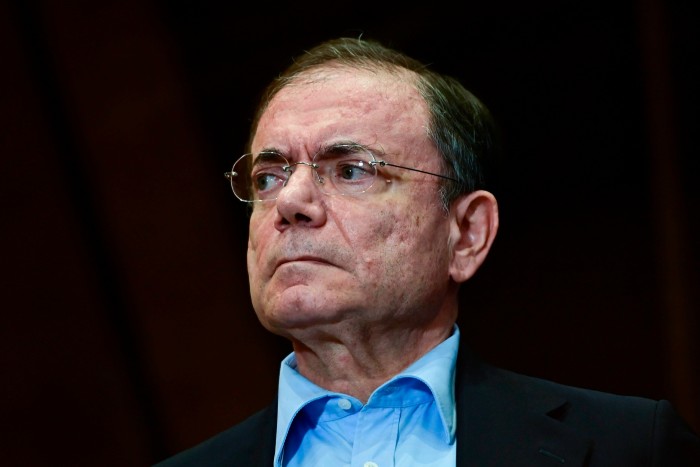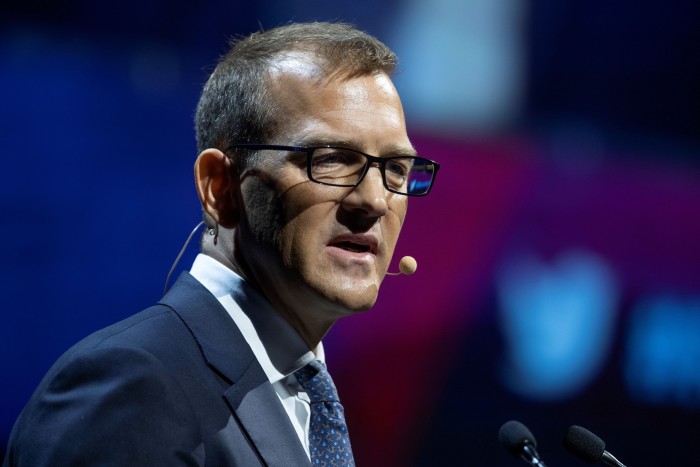French supermarket chain Casino is expected to begin official negotiations with creditors this week, as a group of wealthy investors circle the indebted retail empire built by Jean-Charles Naouri.
Saddled with too much debt, declining revenues and a loss of market share, Casino, which owns the Franprix and Monoprix chains, has been ailing for several years. The retailer’s parent companies through which Naouri controls Casino have been in court-supervised restructuring since 2019.
This week Casino is expected to enter a voluntary negotiation with its creditors — called a procedure de conciliation — that will be overseen by a court-appointed official, Marc Sénéchal, a well-known lawyer specialising in such cases, according to several people involved in the process.
Under French law, the step is one short of a court-supervised debt restructuring — though it may pave the way for such a move — but for now it opens up a critical chapter for a company that employs 53,000 people and is the country’s sixth-biggest food retailer by market share.
The decision to begin official negotiations with creditors, which include major French banks and international hedge funds, comes as Casino has drawn interest from a handful of high-profile investors and billionaires.

In April, Czech billionaire Daniel Křetínský, already Casino’s second-largest shareholder, offered to lead a €1.1bn investment, a move that would dilute Naouri and rip control of the supermarket chain from him. The proposal is backed by investor Marc Ladreit de Lacharrière, whose Fimalac group is now Casino’s third-largest shareholder.
Křetínský’s intervention initially looked like it could derail a plan announced in March to combine Casino’s French retail business with Teract, a smaller rival backed by entrepreneur Moez-Alexandre Zouari, tech billionaire Xavier Niel and investment banker Matthieu Pigasse.
But as the pressure to resolve Casino’s future intensifies, the two camps are talking and will be involved in the conciliation process that is designed to reach agreement both on Casino’s debt and the eventual structure of the group, according to people familiar with the matter.
The retailer and the holding companies through which Naouri controls his stake have €4.9bn in debt repayments due by 2025. Casino had €6.4bn of debt at the end of last year.
Known for his financial engineering that helped create a business empire with holdings spanning Brazilian food shops to renewable energy, Naouri has long tried to preserve his controlling stake despite the deteriorating picture at Casino and its parent companies, including Rallye. His chance of doing so, however, is increasingly slim, the people said.
“Everyone is talking to everyone. They all know each other,” one of the people said. “[Naouri] is now obliged to do a deal where he will lose control . . . Last year he didn’t think he had to, but the business has deteriorated since then.”
Earlier this month, rating agency S&P downgraded Casino, saying “a default, distressed exchange, or redemption appear inevitable within six months, absent unanticipated and significantly favourable” changes in the group’s circumstances.
Casino said it was “carefully reviewing the various expressions of interest” in the group and that “ultimately, decisions will rest with the board”. Teract declined to comment and Křetínský did not respond to a request for comment.
The proposals from Teract and Křetínský would provide relief in different ways for Casino, which reported an almost 5 cent decline in revenues at its French business last quarter.
The former would spin out the French retail operation, reposition the group upmarket with a focus on farm fresh products, provide a cash injection of at least €300mn and an option to sell stores to competitor Intermarché. Křetínský’s offer, meanwhile, would deliver more funding but not address the chain’s operational problems.
Casino and Naouri’s lenders, which include BNP Paribas and Crédit Agricole, will also have sway over the final outcome, while secured and unsecured creditors include multiple US and European hedge funds.
“There are so many parameters and players, so it’s hard to predict how it all could shake out,” said one person involved. “It’s more complicated than three dimensional chess.”
Depending on how the conciliation process goes, Casino may yet end up in a more extensive debt restructuring process, known in France as a procedure de sauvegarde. It has two forms, accelerated and standard.
One advantage of trying to restructure the debts within the conciliation or accelerated safeguard framework is that the process is confined to financial stakeholders, keeping Casino’s suppliers out of it. “Bruno Le Maire [French finance minister] will not allow them to default” on suppliers, said one Casino bondholder.
Given the size of Casino’s workforce and its range of suppliers from dairy farmers to vegetable producers, the French government is closely monitoring events.
But determining Casino’s future will be complicated by the labyrinthine structure that Naouri has built. Its steady slide from investment-grade credit to the lowest reaches of junk have left the group with outstanding bonds and loans on multiple terms.
The complex picture makes forging any agreement among its creditors particularly fraught, creditors and advisers have said.
For example, a portion of Casino’s secured loans are expected to be assumed by Teract if that deal is struck, an arrangement that would prove contentious if those lenders are still able to have a say on debt that is left at what remains of Casino. Meanwhile, some owners of Casino’s unsecured bonds also have more investor protections than others, a further obstacle to creditors finding common ground.

As creditors assess their options, there are signs that Křetínský and the backers of the Teract proposal are open to working together. Křetínský told Le Point magazine earlier this month that his capital injection is “not contradictory” to the Teract project, while Moez told Agence France-Presse they would be “happy to partner with someone as seasoned” as Křetínský.
“The likelihood of seeing both Křetínský and Teract taking over Casino is now higher than ever,” said Clément Genelot, an analyst at Bryan Garnier.
Genelot reckons one scenario that could emerge would give Teract a 30 per cent stake in Casino’s core French business, Intermarché around a quarter, Křetínský around 20 per cent and Naouri under 10 per cent.
But with the talks in the procedure de conciliation only expected to begin this week, there is unlikely to be a quick fix for Casino.
Stay connected with us on social media platform for instant update click here to join our Twitter, & Facebook
We are now on Telegram. Click here to join our channel (@TechiUpdate) and stay updated with the latest Technology headlines.
For all the latest Business News Click Here
For the latest news and updates, follow us on Google News.
